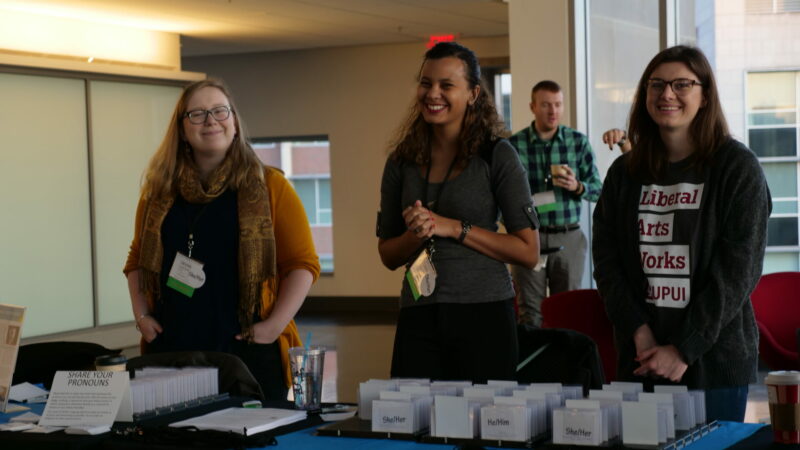Defining professional development and the challenges it brings – Part I
14 October 2021 – Stephanie Rowe and Jennifer Guiliano
Editors’ note: This is the first part of a two-part series.
In ensuring IUPUI’s Public History MA program remains an ethical leader in the field, program faculty are taking a new approach to professional development for students. Professional development focuses on assisting students in gaining proficiency in preparing for the job market, developing career pathways, addressing workplace issues, developing professional networks and relationships, furthering their professional goals, and facilitating their personal and professional identities. Professional development can often be considered part of “soft” skills, like communication and interpersonal skills that are a byproduct of learning, but the reality is that professional development serves as a cornerstone of student growth. As job placement becomes more challenging and long-term employment prospects become increasingly uncertain, the onus on degree programs to equip students with skills that cannot only transfer between employers and fields but also can sustain them over decades has grown.

NCPH’s institutional home at IUPUI offers many opportunities for public history MA students to access professional development opportunities, like the biennial Careers in History Symposium, but work remains to ensure those opportunities are more consistent year-to-year. Photo credit: NCPH.
In part, this shift is a response to the local job market where graduating students are often first employed in positions that emulate their previous internship experiences. Internships equip students with the skills that make them valuable hires, but those internships predispose them to struggle with understanding the possibilities for their career path post-masters. Additionally, because students are often competing with those in their cohort and in previous graduating classes, they can quickly develop a sense of stagnation personally and professionally that inhibits them from imagining that their careers can advance. After all, if getting a job is the measure of a program’s and student’s success, what does it mean when those graduates remain underemployed (and underpaid)?
Statistically, IUPUI’s program looks successful at placing students in jobs upon graduation. But that doesn’t mean those first jobs set students up for long-term career growth. And shouldn’t that really be the measure of success in an ethically managed MA program? It can’t be about initial placement statistics alone; instead, we argue that the success of a master’s program should also be measured by the long-term success of graduates. Conversations regarding the need for a professional development curriculum at IUPUI began with this premise: students do not only need information about entry-level professional issues such as identifying jobs, developing application materials, and preparing for presentations and interviews. They also needed support beyond their first employment post-masters. As most students arrive directly from their undergraduate degrees, this program must equip them with an understanding of the wide variety of professional issues they may encounter over the course of their career, not just in their first years after graduation.
Students noted receiving conflicting advice from faculty and mentors. To whom should they listen? Under what circumstances might a student reject advice or be unable to resolve the dissonance? In part, the dissonance exists as career tracks and approaches are both highly personal and deeply idiosyncratic. But it also exists because there is little conversation among faculty members about professional development in relationship to students. Faculty tend to rely on their own experiences, which are necessarily limited, and may have occurred prior to major cultural, legal, or social shifts in the workplace, including diversity, equity, and inclusion efforts. Given that IUPUI faculty are not only majority-white but also tend to occupy privileged positions socially and culturally, there is a dissonance between their experiences and those of the graduate students whose lived experiences are more diverse. The faculty simply cannot adequately speak to the experiences their Black, Indigenous, Latinx, and other students of color will encounter in the professional workspace. How do we address these challenges? And, how do we do so in a way that ensures every student receives genuine opportunities to learn about professional development and career planning rather than being lucky enough to have a great mentor?
History departments including IUPUI have incorporated professional development opportunities like workshops, intern seminars, and other ad hoc programs into their graduate curriculums, but few have fully developed such a course for master’s students. At IUPUI, workshops and seminars tend to include students in both their first and second years, despite the needs of these students being quite different. First-year students, for example, may need guidance in proper forms of professional communication; those nearer to graduation, on the other hand, might need direct support in assessing job opportunities, negotiating interviews, and understanding contractual offers. What constitutes professional development within a single two-year program can be quite wide. Professional development opportunities are most commonly offered as supplements to courses, internships, or individual advisor-advisee relationships.
Given these challenges, we’ve elected to take a different approach by creating a formal professional development curriculum. As our next post will illustrate, a formal curriculum offers the ability to provide a cohesive strategy that can serve students not just during their time in the program but in the years following graduation.
~Jennifer Guiliano is associate professor of history, adjunct associate professor of American Indian Programs, and adjunct associate professor of American Studies at IUPUI.
~Stephanie Rowe is an academic specialist at IUPUI and executive director for the National Council on Public History, based in the IUPUI School of Liberal Arts.



